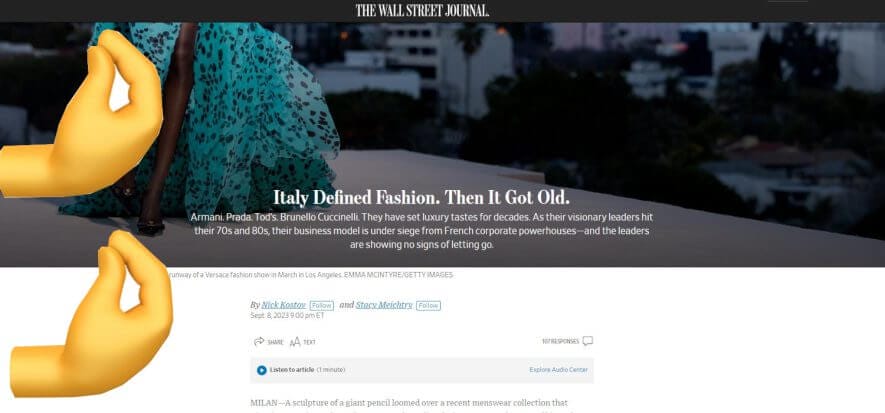“Who’s old?”. The Wall Street Journal (WSJ) in early September took the trouble to accuse Italian fashion of senescence, i.e. of having set the standards of luxury, only to miss the train of history and lag behind the big international groups. The article was partly a response to certain statements by Giorgio Armani, who ruled out a future controlled by French holding companies for his empire. It was partially part of the typical polemics that from overseas are moved against Italian haute couture every time fashion week approaches. From the columns of La Repubblica, the captains of Italian luxury now answer back. Demonstrating the liveliness of the system.
“Who’s old?”
The Wall Street Journal poses the problem of senescence from several points of view: a question of age (starting with Giorgio Armani’s age), then of mentality and the entrepreneurial outlook of brands. “Judging an entrepreneur by his age does not make sense”, retorts Domenico De Sole, an Italian-American CEO who knows international fashion well, having led Gucci and Tom Ford. “Even Ralph Lauren and Bernard Arnault, respectively 83 and 74 years old, are not kids”. According to De Sole, the WSJ errs not only on the side of bon ton. Are the founders too present according to the financial headline? “It is normal that the first generation of a brand tends to be more present in the company”, he replies, “to continue the vision set”.
If holdings work better
The WSJ suggests that the cyclopean transalpine partnerships guarantee better performance in terms of turnover of managers and creatives. Sure? The founders “put love, heart, passion, dreams and desire into their work”, argues Renzo Rosso (OTB) again in the columns of La Repubblica. “This is not present in France, because they are all financial, depersonalised managements. And let’s not forget that 80% of the luxury supply chain is in Italy, and is based on small family-run businesses”.
For Brunello Cucinelli (another of the entrepreneurs the WSJ brings up), the future of Made in Italy is not in question. “If, as they say, 70% of the manufactured goods that French brands sell are produced in Italy, it means that we are the largest manufacturing country in the world for luxury. Our history as artisans has turned us into industrialists who are faithful to the traditions and values of family and territory”, he concludes. “That is why we care so much about product quality, territory and the dignity of workers”.
Read also:










